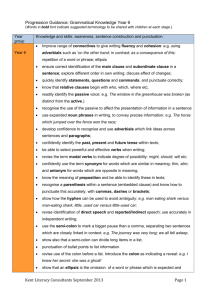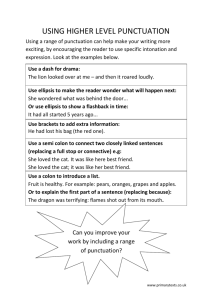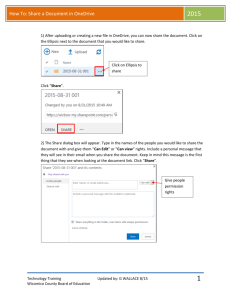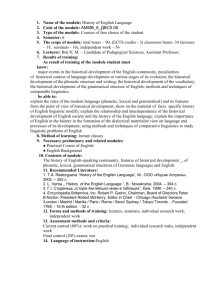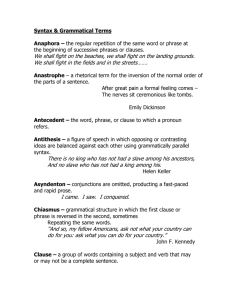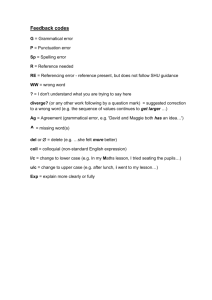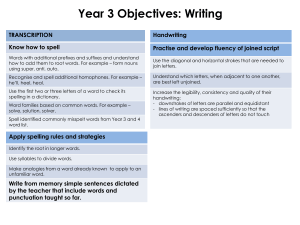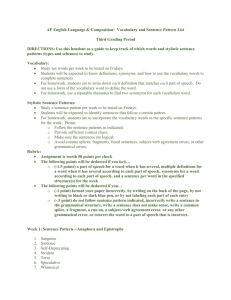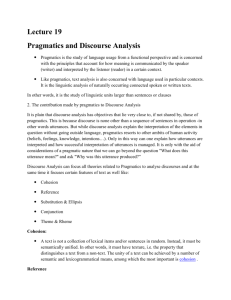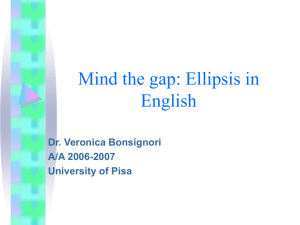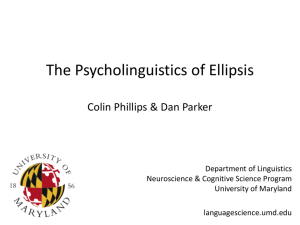MOCK TEST – Bc State Exam in Linguistics – Autumn 2007
advertisement
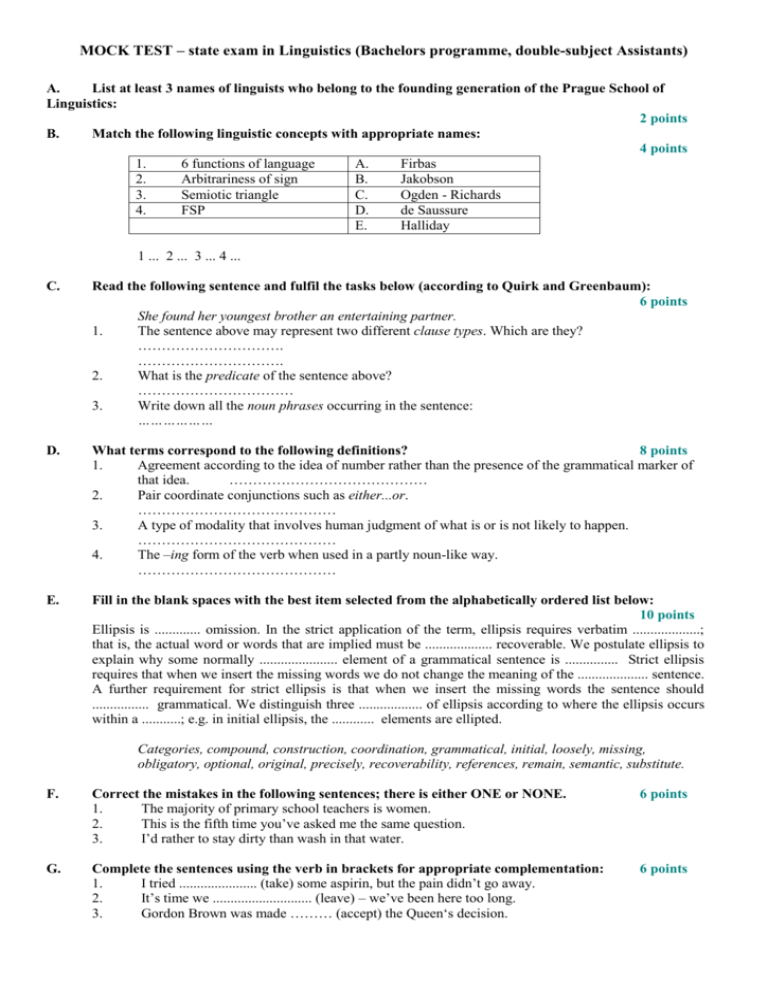
MOCK TEST – state exam in Linguistics (Bachelors programme, double-subject Assistants) A. List at least 3 names of linguists who belong to the founding generation of the Prague School of Linguistics: 2 points B. Match the following linguistic concepts with appropriate names: 4 points 1. 6 functions of language A. Firbas 2. Arbitrariness of sign B. Jakobson 3. Semiotic triangle C. Ogden - Richards 4. FSP D. de Saussure E. Halliday 1 ... 2 ... 3 ... 4 ... C. Read the following sentence and fulfil the tasks below (according to Quirk and Greenbaum): 6 points She found her youngest brother an entertaining partner. 1. The sentence above may represent two different clause types. Which are they? …………………………. …………………………. 2. What is the predicate of the sentence above? …………………………… 3. Write down all the noun phrases occurring in the sentence: ……………… D. What terms correspond to the following definitions? 8 points 1. Agreement according to the idea of number rather than the presence of the grammatical marker of that idea. …………………………………… 2. Pair coordinate conjunctions such as either...or. …………………………………… 3. A type of modality that involves human judgment of what is or is not likely to happen. …………………………………… 4. The –ing form of the verb when used in a partly noun-like way. …………………………………… E. Fill in the blank spaces with the best item selected from the alphabetically ordered list below: 10 points Ellipsis is ............. omission. In the strict application of the term, ellipsis requires verbatim ...................; that is, the actual word or words that are implied must be ................... recoverable. We postulate ellipsis to explain why some normally ...................... element of a grammatical sentence is ............... Strict ellipsis requires that when we insert the missing words we do not change the meaning of the .................... sentence. A further requirement for strict ellipsis is that when we insert the missing words the sentence should ................ grammatical. We distinguish three .................. of ellipsis according to where the ellipsis occurs within a ...........; e.g. in initial ellipsis, the ............ elements are ellipted. Categories, compound, construction, coordination, grammatical, initial, loosely, missing, obligatory, optional, original, precisely, recoverability, references, remain, semantic, substitute. F. Correct the mistakes in the following sentences; there is either ONE or NONE. 1. The majority of primary school teachers is women. 2. This is the fifth time you’ve asked me the same question. 3. I’d rather to stay dirty than wash in that water. 6 points G. Complete the sentences using the verb in brackets for appropriate complementation: 1. I tried ...................... (take) some aspirin, but the pain didn’t go away. 2. It’s time we ............................ (leave) – we’ve been here too long. 3. Gordon Brown was made ……… (accept) the Queen‘s decision. 6 points MOCK TEST – state exam in Linguistics (Bachelors programme, double-subject Assistants) H. Transform the following sentences so that they start as indicated, keeping the original meaning: 6 points 1. I expect you were very tired after your long flight. You must …. 2. I have never seen children who are so well-behaved. Never ........ 3. Since I didn’t know what to do, I called the police. Not......... I. Choose the word or phrase that best completes each sentence: 6 points 1. Tickets are required for admission. ……...……, those who don’t have a ticket won’t get in. A Consequently B Rather C Similarly D Subsequently 2. 3. J. Flights kept ………… because of bad weather. A delaying B being delayed C having delayed D having been delayed I ………… promoted last year but I preferred to stay on the shop floor. A could be B could have been C could have D might have Rewrite the following sentences, replacing the underlined part with a suitable non-finite clause: 4 points 1. My brother, who has split up with his wife, wants to move in with me. …………………………. 2. When the classes are over, I will give you a call. …………………………. K. Study the subordinate clauses and decide whether their function is nominal, adverbial, relative or comparative. With a nominal clause, decide whether it is functioning as subject, object, in apposition or complement; with an adverbial one, specify its semantic function: 6 points 1. 2. 3. L. Where I go is just my business. You’ll find it where you had put it. Could you tell me where you come from? ………..... ……........ ………….. ………......... ………......... ……..………. Do the tasks below: 1. The MP recommends that the new regulation be accepted immediately. a. What mood is used for the verb in the that- clause? b. Is it typical of American or British English? Is it formal or informal? 4 points 2. The dean announced the results yesterday. Rephrase the sentence, emphasizing a. yesterday using a cleft sentence proper: …… b. announced using a pseudo-cleft sentence: …. 3. Isn’t that a beautiful garden! a. Is it direct or indirect speech act? b. What type of question is it? M. Read the following text and fulfil the tasks below: A would-be chicken fancier had some difficulty with her flock and wrote the following letter to the Department of Agriculture: “Something is wrong with my chickens. Every morning when I come out I find two or three lying on the ground cold and stiff with their feet lying in the air. Can you tell me what is the matter?” After a little while she received the following response from the Department: “Dear Madam, your chickens are dead.” 4 points 2 points MOCK TEST – state exam in Linguistics (Bachelors programme, double-subject Assistants) 1. From the text above transcribe phonemically the phrases written in bold, taking into account the context they are in. Include word stresses. 6 points a) b) 2. From the text above choose two different cases of linking and identify which type each example represents. 4 points a) b) 3. From the text above choose two expressions or phrases that could cause potential pronunciation problems for Czech learners of English and give the appropriate reasons for that : 4 points a) b) TOTAL SCORE: 88 points !!!!!!!!!!!!!!See the KEY on the following page!!!!!!!!!!!! A. List at least 3 names of linguists who belong to the founding generation of the Prague School of Linguistics: 2 points Mathesius, Trnka, Havránek, Trubetzkoy, Jakobson, Karcevskij, Mukařovský... B. Match the following linguistic concepts with appropriate names: 5. 6 functions of language F. Firbas 6. Arbitrariness of sign G. Jakobson 7. Semiotic triangle H. Ogden - Richards 8. FSP I. de Saussure J. Halliday 1 ... 2 ... 3 ... 4 ... C. 4 points 1B, 2D, 3C, 4A Read the following sentence and fulfil the tasks below (according to Quirk and Greenbaum): 6 points She found her youngest brother an entertaining partner. 1. The sentence above may represent two different clause types. Which are they? …………………………. SVOC …………………………. SVOO MOCK TEST – state exam in Linguistics (Bachelors programme, double-subject Assistants) 2. 3. What is the predicate of the sentence above? …………………………… found her youngest brother an entertaining partner Write down all the noun phrases occurring in the sentence: ……………… she; her youngest brother; an entertaining partner D. What terms correspond to the following definitions? 8 points 1. Agreement according to the idea of number rather than the presence of the grammatical marker of that idea. …………………………………… notional concord 2. Pair coordinate conjunctions such as either...or. …………………………………… correlatives 3. A type of modality that involves human judgment of what is or is not likely to happen. …………………………………… extrinsic / epistemic modality 4. The –ing form of the verb when used in a partly noun-like way. …………………………………… gerund E. Fill in the blank spaces with the best item selected from the alphabetically ordered list below: 10 points Ellipsis is ............. (grammatical) omission. In the strict application of the term, ellipsis requires verbatim ................... (recoverability); that is, the actual word or words that are implied must be ................... (precisely) recoverable. We postulate ellipsis to explain why some normally ...................... (obligatory) element of a grammatical sentence is .............. (missing). Strict ellipsis requires that when we insert the missing words we do not change the meaning of the .................... (original) sentence. A further requirement for strict ellipsis is that when we insert the missing words the sentence should ................ (remain) grammatical. We distinguish three .................. (categories) of ellipsis according to where the ellipsis occurs within a ........... (construction); e.g. in initial ellipsis, the ............ (initial) elements are ellipted. Categories, compound, construction, coordination, grammatical, initial, loosely, missing, obligatory, optional, original, precisely, recoverability, references, remain, semantic, substitute. F. Correct the mistakes in the following sentences; there is either ONE or NONE. 4. The majority of primary school teachers is women. are 5. This is the fifth time you’ve asked me the same question. OK 6. I’d rather to stay dirty than wash in that water. rather stay 6 points G. Complete the sentences using the verb in brackets for appropriate complementation: 4. I tried ...................... (take) some aspirin, but the pain didn’t go away. taking 5. It’s time we ............................ (leave) – we’ve been here too long. left 6. Gordon Brown was made ……… (accept) the Queen‘s decision. to accept 6 points H. Transform the following sentences so that they start as indicated, keeping the original meaning: 6 points 4. I expect you were very tired after your long flight. You must …. have been very tired after your long flight. 5. I have never seen children who are so well-behaved. Never ........ have I seen children who are so well-behaved. 6. Since I didn’t know what to do, I called the police. Not......... knowing what to do, I called the police. I. Choose the word or phrase that best completes each sentence: 6 points 1. Tickets are required for admission. ……...……, those who don’t have a ticket won’t get in. A Consequently B Rather C Similarly D Subsequently A 2. 3. Flights kept ………… because of bad weather. A delaying B being delayed C having delayed D having been delayed I ………… promoted last year but I preferred to stay on the shop floor. A could be B could have been C could have D might have B B MOCK TEST – state exam in Linguistics (Bachelors programme, double-subject Assistants) J. Rewrite the following sentences, replacing the underlined part with a suitable non-finite clause: 4 points 1. My brother, who has split up with his wife, wants to move in with me. …………………………. My brother, having split up with his wife, wants to move in with me. 2. When the classes are over, I will give you a call. …………………………. The classes (being) over, ……….. K. Study the subordinate clauses and decide whether their function is nominal, adverbial, relative or comparative. With a nominal clause, decide whether it is functioning as subject, object, in apposition or complement; with an adverbial one, specify its semantic function: 6 points 1. 2. 3. L. Where I go is just my business. You’ll find it where you had put it. Could you tell me where you come from? ……nominal ….. ……adverbial..... ……nominal ….. ………subject............. ………place.........…... …….. object ………. Do the tasks below: 4. The MP recommends that the new regulation be accepted immediately. a. What mood is used for the verb in the that- clause? b. Is it typical of American or British English? Is it formal or informal? 4 points subjunctive AmE + formal 5. The dean announced the results yesterday. Rephrase the sentence, emphasizing a. yesterday using a cleft sentence proper: …… It was yesterday that the dean announced the results. b. announced using a pseudo-cleft sentence: …. What the dean did was (to) announce the results yesterday. 4 points 6. Isn’t that a beautiful garden! a. Is it direct or indirect speech act? b. What type of question is it? M. 2 points indirect exclamative question Read the following text and fulfil the tasks below: A would-be chicken fancier had some difficulty with her flock and wrote the following letter to the Department of Agriculture: “Something is wrong with my chickens. Every morning when I come out I find two or three lying on the ground cold and stiff with their feet lying in the air. Can you tell me what is the matter?” After a little while she received the following response from the Department: “Dear Madam, your chickens are dead.” 1. From the text above transcribe phonemically the phrases written in bold, taking into account the context they are in. Include word stresses. 6 points a) /ðɘ dɪˈpɑːtmɘnt ɘv ˈæɡrɪkʌltʃɘ/ b) /ˈkɘʊld ɘn ˈstɪf/ c) /jɘ ˈtʃɪkɘnz ɘ ˈded/ 4. From the text above choose two different cases of linking and identify which type each example represents. 4 points e.g. a) consonant + vowel e.g. flock- and, department-of, something- is, when- I come- out, lying- on the ground, cold- and stiff, lying- in the air, what- is the matter, chickens-are b) vowel + vowel by means of /w/ - e.g. two- or three c) linking /r/ - e.g. after-a while 5. From the text above choose two expressions or phrases that could cause potential pronunciation problems for Czech learners of English and give the appropriate reasons for that : 4 points MOCK TEST – state exam in Linguistics (Bachelors programme, double-subject Assistants) Selected problems a) /ɵ/, /ð/, especially in consonantal clusters – e.ɡ. /rɘʊt ðɘ fɒlɘʊɪŋ/, /sʌmɵɪŋ/, /ɒn ðɘ ɡraʊnd/ b) weak forms x strong forms e.g. /hæd sɘm dɪfɪkɘlti/, /kɘʊld ɘn stɪf/, /ʃi rɪsiːvd/, /frɘm ðɘ dɪpɑːtmɘnt/ c) lack of linking in cases mentioned above d) /æ/ x /e/ - e.ɡ. /fænsɪɘ/, /æɡrɪkʌltʃɘ/, /wɒt ɪz ðɘ mætɘ/, /dɪɘ mædɘm/, /ded/ etc. TOTAL SCORE: 88 points
